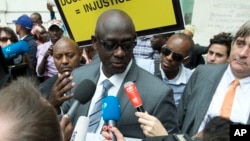Rwanda’s Justice Minister has described as obscene and preposterous a report by Human Rights Watch accusing the government of unlawfully holding some of its most vulnerable citizens in an unofficial detention center in the capital, Kigali.
Johnston Busingye said all detention facilities in Rwanda are run in accordance with United Nations standards and Rwandan laws.
In a report released Thursday, Human Rights Watch detailed accounts from people who it said had been interned at the Gikondo Transit Center between 2011 and 2015.
The organization said its staff interviewed 57 former detainees as well as their relatives and found that Rwandan authorities are unlawfully detaining such people as sex workers, street vendors, beggars, homeless people, and suspected petty criminals as a means of keeping "undesirable" elements off the streets.
Busingye said Human Rights Watch has chosen to “deliberately mislead people with false statements that serve only to undermine Rwanda’s efforts to provide a better life for its citizens”.
“Human Rights Watch has accused my government for many things. Human Rights Watch opposed the Gacaca, has opposed a number of things which contributed to the human development index in this country. So it does not surprise me. What they put out today is a complete invention of their own; it is twisting the truth to fit some pattern that I have yet to understand,” he said.
The Gacaca courts were Rwanda’s method of transitional justice designed to promote communal healing and rebuilding in the wake of the country’s 1994 genocide.
Busingye said Rwanda does not use its citizens to keep its cities clean.
"To suggest Rwanda’s poor people or Kigali’s poor people are kept away in order to keep the city clean is obscene; it’s preposterous. We keep our city clean because we pay people to clean it, because we keep our lights on, because we plant grass and do walkways for pedestrians. So how do human beings become part of that? I just don’t understand,” Busingye said.
Busingye said the government stands by its policy of rehabilitation rather than incarceration.
“We do not run detention centers that are not in our laws or run under United Nations minimum standards for detention centers. What we do have is a series of rehabilitation centers where we attempt to rehabilitate unfortunate youths in our society who unfortunately end up in drugs, or other forms of delinquency, petite crimes and prostitution,” Busingye said.
Busingye said the programs have been successful over the years in preventing repetition.
“For the last couple of years we have had more than 7,000 post-delinquency rehabilitation graduates who very proud fellows are now running their own lives as carpenters, tailors, welders and all sorts of other skills,” he said.
The Human Rights Watch report said detainees are regularly beaten in order to humiliate them or extort money as well as to punish.
Busingye said the Rwandan government takes all allegations of rights abuses seriously, however speculative they may be. But he said the allegations made Human Rights Watch have no merit.
He said Human Rights Watch has a Memorandum of Understand with Rwanda’s Ministry of Justice through which the group can raise human rights concerns. But Busingye said the organization has failed to utilize the mechanisms.
“Indeed this is the trademark of Human Rights Watch. They will always depend of anonymous sources. They will never cite evidence. If the police in Rwanda beat up someone, can Human Rights Watch point out something? Can we get evidence that someone has been beaten up?” he asked.
Busingye invited Human Rights Watch to provide information on the alleged cases cited in its report so that the government may investigate them.




